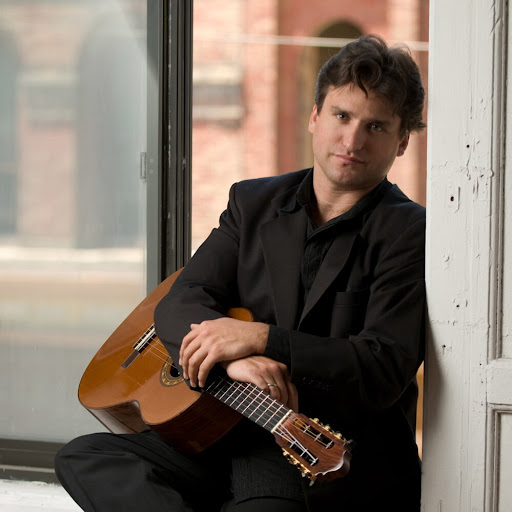by Kevin McLaughlin

The guitarist displayed technical mastery, warmth of spirit, and a prodigious memory throughout the evening. Though a 90-minute performance featuring music by 13 different composers may be old hat to guitar recitalists, the assuredness with which Izquierdo accomplished this was a cause for wonder. In a moment of candor toward the end, he acknowledged the challenge of “having to keep five different programs in his head” on his current tour.
Izquierdo’s memory, as well as his ability to tell stories, made for an easy rapport with the audience. Despite an uncooperative PA system, those who made the extra effort to hear what the guitarist had to say between pieces were rewarded by delightful introductions, backstories, and illuminating context. Though the concert was held in the beautiful Plymouth Church sanctuary, it may as well have taken place in Izquierdo’s own living room.
Particular highlights of the all-Cuban first half included Eduardo Martín’s Mirandote (“Looking at You”), a simple ballad followed by a graceful dance, both with the power to transport the listener to some distant, sun-drenched place. The performer’s lovely legato in the ballad drew out exquisite beauty from the instrument.
The four dances by Ignacio Cervantes, transcribed by Jesús Ortega from 41 Danzas Cubanas for piano, were especially well-played, and if one can intimate such things from a distance, of some personal significance to the performer. The composer, a Spaniard by birth, came to live in Cuba before being forced to return to Spain during the Cuban liberation movement of the 1870s. Titles such as Adios a Cuba (“Farewell to Cuba”), El Mensaje (“The Message”), and Los Tres Golpes (“The Three Strikes”) hint at this sense of rootlessness. Like the composer, Izquierdo has also felt displaced in mid-life, having left his native Cuba to live in the United States 27 years ago.
The Spanish works on the second half were equally compelling. Izquierdo’s performance of the Sonata in D, K. 208 by Domenico Scarlatti (who spent the better part of his professional life in Spain) showed off a lovely sense of lightness, giving clarity to the lines and an open lane for embellishment. In Joaquin Rodrigo’s En los Trigales (“In the wheat fields”), contrapuntal lines were not only audible but bestowed with distinct tone colors.
Izquierdo’s own transcription of “The Miller’s Dance” from Manuel de Falla’s The Three-Cornered Hat was a faithful interpretation of this large orchestral work, reduced somehow to six strings. The flamenco roots of de Falla’s original were, if anything, enhanced by this adaptation.
Student performer Jacob Belcher opened the concert with two short works. Belcher’s dedication and poise after only a year of study led to a successful debut.
As another high-water mark of the Guitar Society’s International Series, René Izquierdo’s recital was a pleasing confirmation of the healthy state of Cleveland guitar performance. May it continue, and may this performance arouse interest in the rest of the series (Brasil Guitar Duo on March 11, David Russell on April 22).
Published on ClevelandClassical.com February 1, 2023.
Click here for a printable copy of this article



